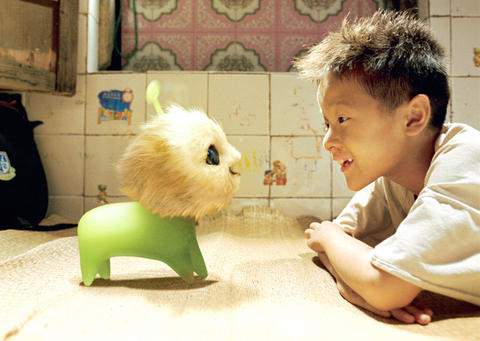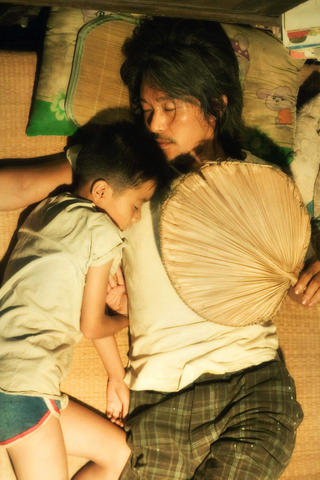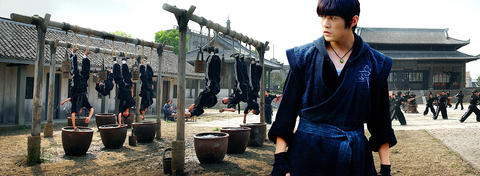Two new movies promise to keep Lunar New Year's revelers in stitches. After a three-year wait, Stephen Chow (周星馳) returns to the silver screen with his sci-fi family comedy CJ7 (長江七號). Competing with him for holiday audiences is Taiwan's slapstick comedy whiz Chu Yen-ping (朱延平), who teams up with Jay Chou (周杰倫) and a top-notch production team for Kung Fu Dunk (功夫灌籃), a blockbuster-wannabe that mixes martial arts, sport and romance.
Chow's fifth feature, CJ7 continues the use of a familiar storyline - a nobody who makes it against all the odds - tackled in 2001's Shaolin Soccer (少林足球) and 2004's Kung Fu Hustle (功夫).
On this occasion, the story revolves around down-and-out construction worker Ti (played by Chow) and his elementary-school-aged son Dicky (Xu Jiao, 徐嬌) who keep their spirits high despite living in poverty. Risking his life working on a skyscraper by day and collecting garbage by night, Ti insists on sending Dicky to a private school so that he can have a good education.

PHOTO COURTESY OF SONY PICTURES AND SCHOLAR FILMS
A target of mockery for school bullies, Dicky's life changes when CJ7, a digitally generated alien puppy mysteriously appears in his home. Gradually, the boy realizes that the dog from outer space may not have the power to make him a hero at school. What the creature can do, however, is help Dicky understand what is most important in life.
Inspired by Steven Spielberg's ET, made some 20 years ago, the film is a family-friendly departure from Chow's previous movies. The director had younger audiences in mind while making the comedy flick that recalls the Doraemon manga series, which features a robotic cat that travels back in time from the 22nd century to aid a schoolboy.
CJ7 is disappointingly derivative, and you can expect less than the usual quota of wacky antics from Chow himself. The Hong Kong actor/director delegates most of the comic business to other characters, leaving himself to come across as a loving father figure who orchestrates a few well-executed lachrymose moments. Touching on the life of odd-job laborers living below the poverty line in a Chinese city, CJ7 is further invested with a bit of Chaplin-esque humanity. A brief sequence of the construction workers building the skyscrapers comes close to being an ode to the deprived.

PHOTO COURTESY OF SONY PICTURES AND SCHOLAR FILMS
While Chow retreats from the main stage, 10-year-old actress Xu Jiao steps into the main role. Selected from nearly 10,000 children, she is cast as Chow's son in the film. She has a natural screen presence and pulls off Chow's humor with ease. Her talent is such that Chow, who is said to have become Xu's godfather, has expressed high hopes that the girl will take over from him after he retires.
The supporting roles, each integral parts of the work, are commendably cast. Despite a change in style, Chow's signature humor remains intact and there are also plenty of parodies of Mission Impossible, the Harry Potter movies, Shaolin Soccer and Kung Fu Hustle.
Kung Fu Dunk, with a record-breaking budget, cast of big-name pop stars and fancy CGI, could hardly fail. In the plot, Shijie (played by Chou) is an orphan brought up in a martial arts school. Con artist Li (Eric Tsang, 曾志偉) spots the young talent and connives to cash in on his basketball skills. He generates sufficient media hype to have the boy join the university basketball team.

PHOTO COURTESY OF SONY PICTURES AND SCHOLAR FILMS
Under the guidance of the alcoholic team captain (Wilson Chen, 陳柏霖) and other teammates, Shijie quickly becomes a basketball star and leads the team to the championship. Meanwhile, his feelings for the captain's sister, Lily (played by Hong Kong's Charlene Choi, 蔡卓妍), grow. But he's crossed in love. The girl's attention is focused on the team's other star player, Xiou Lan (Chen Chu-he, 陳楚河).
In the final match - with a team of rogue players who resort to dirty tricks - it is up to Shijie to stop the evil enemy and right the wrongs with his kung fu prowess.
Hailed as the biggest-budget film ever made in the history of Taiwanese cinema, the lead role is tailor-made for Chou. He jumps, kicks, fights, wallops and drawls. He doesn't talk much but fakes cuteness convincingly and even pulls off some comedy. The pop idol abandons his coolness to become a lovable, simple-hearted lad. The rest of the cast is, however, frittered away. The troupe of pretty-faced pop stars pack no punch, while veteran actors like Ng Man-tat (吳孟達) and Leung Ka-yan (梁家仁) have no room to shine.
With a budget of more than NT$330 million, the filmmakers had money to burn on pricey visual effects. They created a basketball extravaganza with acrobatic martial arts that promise to elicit wows from the audience. Director Chu's signature cheesy humor and hackneyed plot devices, such as the battle between a kung fu fighter and evil wrestler-looking macho guys, however, fail to impress and feel slightly out of date.
For fans, Kung Fu Dunk is a fine holiday choice, but for the rest of us, this is yet another example of Chu's inability to tell a story no matter how well-funded and polished.

June 2 to June 8 Taiwan’s woodcutters believe that if they see even one speck of red in their cooked rice, no matter how small, an accident is going to happen. Peng Chin-tian (彭錦田) swears that this has proven to be true at every stop during his decades-long career in the logging industry. Along with mining, timber harvesting was once considered the most dangerous profession in Taiwan. Not only were mishaps common during all stages of processing, it was difficult to transport the injured to get medical treatment. Many died during the arduous journey. Peng recounts some of his accidents in

“Why does Taiwan identity decline?”a group of researchers lead by University of Nevada political scientist Austin Wang (王宏恩) asked in a recent paper. After all, it is not difficult to explain the rise in Taiwanese identity after the early 1990s. But no model predicted its decline during the 2016-2018 period, they say. After testing various alternative explanations, Wang et al argue that the fall-off in Taiwanese identity during that period is related to voter hedging based on the performance of the Democratic Progressive Party (DPP). Since the DPP is perceived as the guardian of Taiwan identity, when it performs well,

The Taiwan People’s Party (TPP) on May 18 held a rally in Taichung to mark the anniversary of President William Lai’s (賴清德) inauguration on May 20. The title of the rally could be loosely translated to “May 18 recall fraudulent goods” (518退貨ㄌㄨㄚˋ!). Unlike in English, where the terms are the same, “recall” (退貨) in this context refers to product recalls due to damaged, defective or fraudulent merchandise, not the political recalls (罷免) currently dominating the headlines. I attended the rally to determine if the impression was correct that the TPP under party Chairman Huang Kuo-Chang (黃國昌) had little of a

A short walk beneath the dense Amazon canopy, the forest abruptly opens up. Fallen logs are rotting, the trees grow sparser and the temperature rises in places sunlight hits the ground. This is what 24 years of severe drought looks like in the world’s largest rainforest. But this patch of degraded forest, about the size of a soccer field, is a scientific experiment. Launched in 2000 by Brazilian and British scientists, Esecaflor — short for “Forest Drought Study Project” in Portuguese — set out to simulate a future in which the changing climate could deplete the Amazon of rainfall. It is